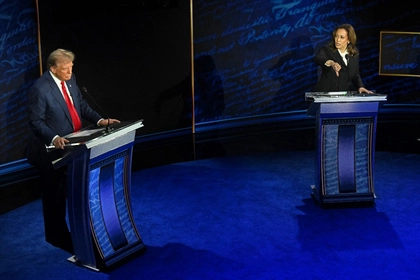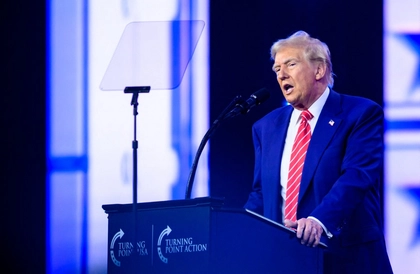As the 2024 US presidential election enters its full swing, Republicans and Democrats are working tirelessly to ensure that their candidate is elected as the next president of the United States. Former President Donald Trump and Vice President Harris are touring the country trying to sway the opinions of millions of voters. But as their campaigns work vigorously, another matter will be at play.
According to multiple reports, the Russian Federation intends to interfere in the US presidential election. Director of National Intelligence Avril Haines stated that the Russians are “eroding trust in [US] democratic institutions, exacerbating sociopolitical divisions in the United States, and degrading Western support to Ukraine.” Meanwhile, the Office of the Director of National Intelligence announced that the Russians are using artificial intelligence to spread disinformation by making fake photos and audio messages. Finally, White House National Security Communications Advisor John Kirby recent argued that the United States should “expect the worst out of [Russia]” during the 2024 presidential election.
JOIN US ON TELEGRAM
Follow our coverage of the war on the @Kyivpost_official.
Both political campaigns heeded these warnings from the US intelligence agencies. They are taking measures to combat election meddling. But neither campaign should be surprised by Russia’s antics. In fact, both candidates are well-versed in US-Russian relations.

‘Just Peace’ and ‘Lasting Peace’ – Nations React to Trump’s Inauguration
During the 2016 US presidential election campaign, the Federal Bureau of Investigation (FBI) found that members of the Trump campaign had established suspicious links with Russian officials. These Americans met with their Russian counterparts, where they discussed sensitive information. Several of these individuals would be charged by the Department of Justice (DOJ), and these former campaign officials would plead guilty in their respective cases.
The FBI and DOJ also launched an investigation to determine how Russia had influenced the 2016 presidential election. In their findings, the FBI and DOJ stated that the Russian Federation had obstructed the US electoral process. They also said the Russians had “conspir[ed] to commit an offense against the United States.” Finally, the investigation found that several “Trump associates repeatedly lied to investigators about their contacts with Russians” during and after the campaign process. Many of these individuals were eventually punished.
Aside from the work conducted by the FBI and DOJ, the US Senate Intel Committee also launched its own investigation. The Bipartisan group published a report stating that the Russian Federation had used social media platforms to “interfere with the 2016 US election.” In addition, the report provided information on how the Russian Federation “launched an aggressive effort to interfere in the [US] election on Trump’s behalf.”
In response, former President Trump called the investigation a “hoax.” He argued that the information and news connecting his campaign to the Russian Federation were “unbelievably fake,” and the former president launched attacks against various media outlets. He claimed the reports were untruthful and unreliable.
Following these investigations, the Trump-Pence administration implemented new policies for the US-Russia relationship. One method the administration adopted was to punish the Russians for their continued meddling. Former President Trump would impose various sanctions on the Russian Federation. For example, the “Countering America’s Adversaries Through Sanctions” Act, which was passed in 2017, placed penalties on Russian institutions and crude oil projects. Then, in 2018, former President Trump issued an executive order that would impose sanctions on countries that sought to meddle in US elections, which included Russia. In addition, in 2017 and 2018, several Russians were sanctioned for their attempts to influence the 2016 and 2018 US elections.
But former President Trump and members of his cabinet frequently visited with their Russian counterparts. One notable encounter was in June 2018, when former President Trump met with Russian President Vladimir Putin in Finland. During the meeting in Helsinki, the American leader was asked about Russian interference during the 2016 US presidential election. In response, the American president refuted intelligence reports from US intelligence agencies that Russia interfered in the election. Instead, former president Trump said he “[did not] see any reason why” Russia would have meddled in the election. His statement was condemned by several US politicians and government officials.
During the start of the Russian full-scale invasion of Ukraine in February 2022, Trump failed to condemn Putin’s actions. Instead, he blamed the US for Russia’s full-scale war.
Another notable event in 2018 was after the Russian presidential election. In previous years, American officials had condemned the electoral process in Russia, stating that President Putin and his cronies rigged the election. At the time, several national security advisers told former President Trump that he should not to congratulate the Russian dictator. Despite these warnings, he called the Russian leader anyway and congratulated him.
Beyond these episodes, former President Trump has complimented President Putin on various occasions. After his time in office, former President Trump has stated that Putin is a strong leader. He said he “got along well” with the Russian leader, and the former American president has called the Russian dictator a “strong man.”
Then, during the start of the Russian full-scale invasion of Ukraine in February 2022, former President Trump failed to condemn President Putin’s actions. Instead, he blamed the United States for Russia’s full-scale war. The former president also previously suggested that Russia has a right to claim Ukraine’s territory in the south and east.
More recently, during the Republican National Convention in July, thousands gathered in Milwaukee to celebrate Trump’s nomination for the 2024 US presidential election. During the event, the Republican Party announced its platform for the campaign. The Russian Federation was not mentioned in the document. The Republican Party also did not state how it would combat Russian meddling and interference.
Finally, during a recent meeting with Ukrainian President Volodymyr Zelensky, Trump discussed the Russian invasion of Ukraine. The former US president reminded Zelensky that he has a “very good relationship” with President Putin. Trump also argued that Ukraine should concede to Russia and that the Ukrainians should sign a forced peace agreement with Russia.
Meanwhile, Vice President Kamala Harris has taken a different approach toward Russia. Like Trump, her first significant encounter with the Russian Federation occurred during the 2016 US presidential election. At the time, then-Senator Harris served on the Senate Intelligence Committee. She, along with several other senators, launched a bipartisan investigation into the Trump campaign, its relationship with the Russian Federation, and Russian meddling in the US election. In their final report, the bipartisan committee stated that the Russians had “interfere[d] with the 2016 US election.” Then-Senator Harris also used the investigation to emphasize the significance of election meddling. During this period, she argued that the US government should invest in “election security in light of Russia’s attempts to sway the vote.” She co-sponsored bipartisan bills to help strengthen the electoral process in the United States, and she supported legislation that punished Russia for election interference.
Following the 2020 US presidential election, Harris has condemned Russia’s interreference across the globe. She has spoken out against Russian meddling in international affairs. For example, prior to Russia’s full-scale invasion of Ukraine, the vice president said that the US, its allies, and its partners would “impose significant, and unpreceded economic costs” on Russia if it chose to invade Ukraine. Then, during the war, the vice president called on the international community to provide aid to Ukraine as it fights for its survival against Russia. She has encouraged international sanctions, and she has condemned the invasion.
This has made her a target of the Russian government. In April 2022, she was sanctioned by the Russian government. The Russian Federation also noted that Harris has an “unfriendly rhetoric” toward its government.
Aside from the Russian government, the vice president has caught the attention of Russian online accounts. Numerous trolls and bots on social media platforms have targeted the vice president, where several racist and sexist remarks have been made toward her. Despite the comments made against her, she has continued to stand strong and firm against Russia.
As the presidential candidate for the 2024 US presidential election, Harris has stated that her party will continue to hold Russia accountable for its actions. During the Democratic National Convention in Chicago in August, the Democratic Party announced its platform. In the document, the Democrats stated that they would work to “deter further Russian aggression.” The platform also stated that Vice President Harris and her team will look to “hold Putin accountable on the world stage,” and that they will seek to “constrain Russia’s threat to allied nations and America’s vital interests.” This will be done through coordinated efforts with America’s allies and partners, where they will discuss sanctions policies and other methods to hold the Russians accountable.
Following the Democratic National Convention, both candidates gathered for the presidential debate in September. During the event, both candidates shared their stances on Russia and Putin. At the presidential debate, Trump said that he knows Putin “very well”, he has a good relationship with him, and that Putin respects him. He also claimed that if he was president, President Putin would be “sitting in Moscow much happier than he is right now.” Meanwhile, Harris said that if she were to be elected, she would continue to stand up to President Putin and Russia. She said she would continue to build alliances and partnerships around the world, and that they would “stand up for [Western values] and principals and not sell them” to authoritarian rulers.
Finally, Harris recently met with Zelensky. During their meeting, the vice president said that the United States, its allies, and partners must “keep pressure on Russia to stop” the invasion of Ukraine. She added that the international community must “keep sanctions against Russia strong” and that the globe should do everything it can to fore Russia to end its war. Harris then concluded that Russia’s threat must be reduced to zero, and that “Russian war criminals [must be brought] to justice.”
In short, history has shown that the Trump-Pence and Biden-Harris administrations have pursued different policies to engage with Russia. The US-Russia positions established and set forth by both administrations were clear, and both candidates will look to continue their respective strategies should they be elected in November. The Russian Federation will watch carefully to see which policy will unfold after the US presidential election.
The views expressed are the author’s and not necessarily of Kyiv Post.
You can also highlight the text and press Ctrl + Enter










